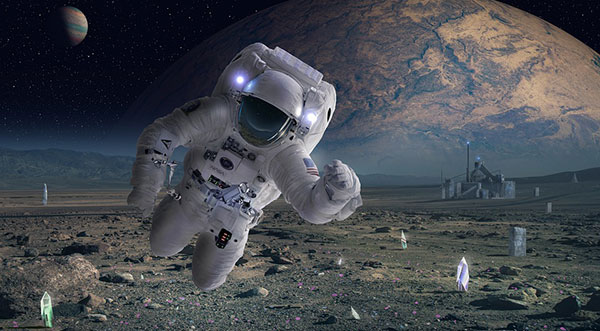Space exploration has always captivated the human imagination. From ancient civilizations gazing at the stars to modern-day spacecraft venturing into the cosmos, humanity’s quest to understand the universe continues to evolve. Exploring spaces beyond our planet not only satisfies our innate curiosity but also holds the key to unlocking a multitude of scientific discoveries and technological advancements.

The Evolution of Space Exploration
The journey of space exploration began with humble telescopes and observatories, gradually leading to groundbreaking missions such as the Apollo Moon landings in the 1960s and 1970s. Since then, technological advancements have propelled humanity further into the cosmos. Robotic probes have visited every planet in our solar system, capturing breathtaking images and collecting invaluable data about these celestial bodies.
Unraveling the Mysteries of the Universe
One of the primary objectives of space exploration is to unravel the mysteries of the universe. Scientists seek answers to fundamental questions about the origin, structure, and evolution of galaxies, stars, and planets. By studying distant celestial objects and phenomena, such as black holes, supernovae, and dark matter, astronomers gain deeper insights into the underlying principles governing the cosmos.
Pioneering Interplanetary Travel
Interplanetary exploration represents the next frontier in space exploration. Mars, with its tantalizing potential for harboring life, has become a focal point of human missions beyond Earth. Initiatives like NASA’s Artemis program aim to establish a sustainable human presence on the Moon as a stepping stone toward crewed missions to Mars and beyond. Moreover, private companies such as SpaceX are driving innovation in space transportation, with ambitious plans to colonize other planets in the future.
Expanding Scientific Frontiers
Space exploration serves as a catalyst for scientific discovery across various disciplines. Research conducted in microgravity environments aboard the International Space Station (ISS) has led to breakthroughs in fields ranging from medicine and materials science to agriculture and biotechnology. Furthermore, studying exoplanets orbiting distant stars offers tantalizing prospects for finding Earth-like worlds capable of supporting life.
Technological Innovations and Spin-Off Benefits
The pursuit of space exploration has resulted in numerous technological innovations that benefit society as a whole. Technologies originally developed for space missions, such as gengtoto satellite communications, GPS navigation, and weather forecasting, have become integral parts of everyday life. Moreover, advancements in spacecraft propulsion, life support systems, and robotics continue to push the boundaries of engineering excellence.

Inspiring Future Generations
Space exploration inspires awe and wonder, igniting the imaginations of people of all ages. It serves as a powerful symbol of human ingenuity, collaboration, and perseverance. By showcasing the beauty and vastness of the cosmos, space exploration encourages the next generation of scientists, engineers, and explorers to dream big and pursue careers in STEM (science, technology, engineering, and mathematics) fields.
In the grand tapestry of human history, space exploration occupies a unique place—a testament to our innate curiosity, pioneering spirit, and relentless quest for knowledge. As we continue to explore spaces beyond Earth, we not only expand our scientific understanding of the universe but also redefine the limits of what is possible. With each new discovery and technological breakthrough, we inch closer to unraveling the mysteries of the cosmos and ultimately, our place within it.
Exploring Spaces: Advantages and Disadvantages
Space exploration represents one of humanity’s boldest endeavors, pushing the boundaries of what we know and what we can achieve. While it offers numerous benefits, it also presents challenges and drawbacks that must be carefully considered. Let’s delve into the advantages and disadvantages of exploring spaces beyond Earth.
Advantages
- Scientific Discovery: Space exploration yields invaluable insights into the universe, helping us better understand the cosmos and our place within it. Discoveries ranging from exoplanets and black holes to the origins of the universe itself have revolutionized our understanding of fundamental physics and astronomy.
- Technological Innovation: The pursuit of space exploration drives technological advancements in various fields, including spacecraft design, robotics, materials science, and telecommunications. Many technologies developed for space missions have practical applications on Earth, benefiting industries such as healthcare, transportation, and telecommunications.
- Inspiration and Education: Space exploration inspires awe and curiosity, captivating the imaginations of people around the world. It serves as a powerful tool for education, encouraging interest in science, technology, engineering, and mathematics (STEM) fields among students and the general public. Additionally, iconic missions like the Apollo Moon landings have become symbols of human achievement and perseverance.
- International Collaboration: Space exploration fosters international cooperation and collaboration, transcending political and cultural boundaries. Projects like the International Space Station (ISS) bring together astronauts, scientists, and engineers from different countries, promoting peaceful coexistence and mutual understanding.
- Economic Benefits: While costly, investments in space exploration can stimulate economic growth and innovation. The space industry supports a wide range of jobs, from aerospace engineers and scientists to technicians and support staff. Moreover, commercial space ventures, such as satellite launches and space tourism, offer opportunities for private sector involvement and revenue generation.

Disadvantages
- High Costs: Space exploration is a costly endeavor, requiring significant financial investments for spacecraft development, launch operations, and mission infrastructure. Limited funding may divert resources away from other pressing societal needs, such as healthcare, education, and environmental conservation.
- Technological Risks: Space missions entail inherent risks, including equipment failures, launch accidents, and exposure to radiation. The harsh conditions of space present numerous technical challenges, requiring robust engineering solutions and contingency plans to ensure mission success and crew safety.
- Environmental Impact: Space exploration has environmental consequences, particularly in terms of rocket emissions and space debris. Rocket launches release greenhouse gases and other pollutants into the atmosphere, contributing to climate change and air pollution. Additionally, spent rocket stages and defunct satellites contribute to the proliferation of space debris, posing collision risks to operational spacecraft.
- Ethical Considerations: The exploration of space raises ethical questions regarding resource exploitation, planetary protection, and the potential for contamination. As humanity ventures beyond Earth, we must consider the ethical implications of our actions, including the preservation of celestial bodies and the prevention of harmful interference with extraterrestrial environments.
- Social Equity: Critics argue that the benefits of space exploration are not equitably distributed, with marginalized communities often excluded from participation and access to opportunities in STEM fields. Addressing disparities in education, representation, and access to resources is essential to ensure that the benefits of space exploration are shared by all members of society.
Conclusion
Exploring spaces beyond Earth offers both promise and peril, with potential benefits and challenges that must be carefully weighed. While space exploration holds immense scientific, technological, and inspirational value, it also presents financial, environmental, and ethical considerations that warrant thoughtful deliberation. By recognizing and addressing these advantages and disadvantages, we can strive to realize the full potential of space exploration while mitigating its drawbacks, ensuring a sustainable and inclusive future for humanity’s journey into the cosmos.
Read More Article About “Fleurburger Unleashed: A Culinary Marvel Transforming Gourmet Burgers into Art“

